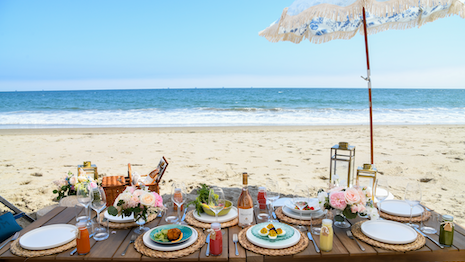 With plenty to celebrate, Gen Z travelers are not only looking to go places but to experience new things. Image credit: Getty Images/NerdWallet
With plenty to celebrate, Gen Z travelers are not only looking to go places but to experience new things. Image credit: Getty Images/NerdWallet
Over the last two years, eagerness to travel has rapidly accelerated among the Gen Z population, according to new data from YouGov.
Vying to lock the air miles under their belt, Gen Z is presenting a great opportunity to brands to appeal to them based on their lifestyles and events that motivate travel. As these consumers seek sustainable options woven throughout traveling offerings as well as new and exciting opportunities, brands can curate offerings and packages that establish mutually beneficial relationships.
For this study, YouGov defined the Gen Z population as those aged between 18 and 24 and retrieved data from its Global Travel Profiles, spanning interviews of 25,918 people aged 18 and over, across 25 countries in April 2022.
Comings and goings
To understand why Gen Z consumers are so eager to travel, it is important to consider the life events they may be experiencing.
In the past 12 months, 21 percent of Gen Zers said they finished school or college, 21 percent said they started a new job/their first job/changed their job, 13 percent said they started university and 10 percent said they graduated from university.
 Travel is one of the top categories Gen Z plans to spend more on in the next 12 months. Image credit: Snap, Inc.
Travel is one of the top categories Gen Z plans to spend more on in the next 12 months. Image credit: Snap, Inc.
With plenty to celebrate, Gen Z travelers are not only looking to go places, but to experience new things — from new drinks to cryptocurrencies.
More than half of Gen Z travelers like to try new drinks; 46 percent said they like to seek out challenging situations; 43 percent said they like to seek out experiences that will make for great social media content and 41 percent said they do not mind taking risks with their money.
When planning their next trip, half of Gen Zers will prioritize adventure, 48 percent want to simply "get away" and 43 percent want space for relaxation.
Regarding what activities they would like to spend more on in the next 12 months, traveling is in the top three, trailing clothes and accessories at 32 percent and dining out at 27 percent. Gen Z leads all age groups in its intention to spend more on travel in the next year.
Three-quarters of Gen Z respondents plan to take a trip in the next 12 months, with many being open to both domestic and international travel.
More than half of Gen Z respondents in Indonesia, Thailand and Malaysia said they plan to take domestic vacations in the next 12 months, while just below 50 percent of respondents in Spain, China and France agree.
Forty-seven percent of Gen Z respondents admitted that they are eager to travel internationally, with those living in European markets more likely to take an international vacation in the next year.
 Many Gen Z travelers are looking for relaxation from their next vacation. Image courtesy of Rosewood Hotels & Resorts
Many Gen Z travelers are looking for relaxation from their next vacation. Image courtesy of Rosewood Hotels & Resorts
Forty percent of Gen Z respondents said they stay at a standard hotel of 3 stars or less, 24 percent said they stay with a family or friend and 23 percent said they look for a luxury hotel/condominium/resort of 4 or 5 stars. A luxury hotel is the number one accommodation preference in the UAE and Saudi markets.
Some of the top types of vacations Gen Z respondents noted taking are volunteering/eco-tourism, performing/visual art festivals, adventure/expedition types and winter sports.
Regarding what they would consider doing on their next vacation, 45 percent of Gen Z respondents said they would seek authentic experiences that are representative of the local culture, 38 percent said they would stay in eco-friendly or green accommodations, 37 percent said they would prioritize spending money with local businesses or on local produce and 34 percent said they would search for sustainable travel offers.
Seeking sustainability
Gen Z travelers are not only cognizant of the kinds of activities they want, but also the ways in which they can implement and prioritize their values.
When identifying issues that mean the most to them, 43 percent of Gen Z identified climate change, 37 percent said the European Union, 36 percent said green energy priority, 34 percent said tuition and 34 percent said gay marriage.
With concern for societal and environmental issues, Gen Z travelers could meld these backgrounds into what they are looking for from their travel brands. Travelers of this age group could be looking for clear policies and initiatives from the brands with which they are staying and supporting.
Global hospitality group Accor is calling upon its employees to embark on new, thoughtful sustainability training.
Citing the sustainable priorities at the heart of its ethos, Accor is implementing an ambitious training program designed to boost employee awareness of environmental challenges. Accor has also launched a training platform, School For Change, and additional events that promote education regarding the environment (see story).
Last year, luxury travel company Wild Nectar Collection launched with a focus on sustainability, catering to affluents who are becoming more cognizant of the environmental impact of their travels.
The company offers unique travel experiences based on sustainability, with curated trips that each hold a calculated "eco score." Wild Nectar Collection also introduced sustainability awards based on trip operators’ achievements, further fostering its eco-friendly roots and mission (see story).